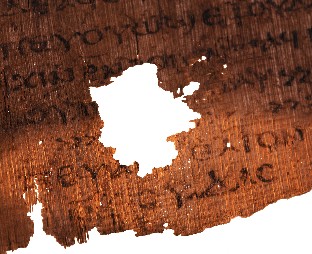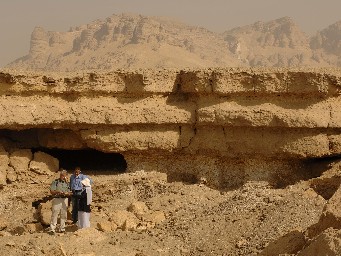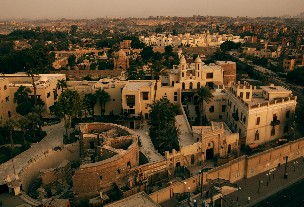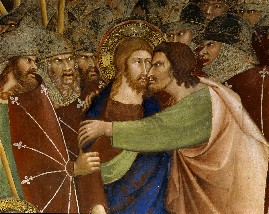|
World | Egypt Society | Culture - Arts | Science - Education Secrets of Judas, Jesus kept in Egypt for 1700 years
In the first centuries after the death of Jesus, Christian communities rapidly spread around the Mediterranean, including Egypt. Only with time, Christians were united in one official and hierarchical Church and during the 4th century, the church struggled to agree on which texts to include in the Bible. By then, the Gospel of Judas had already been widely condemned by the established church.
The Gospel of Judas is believed to have been written in the first century after the death of Jesus, being among the oldest written descriptions of his life and lectures. It does not claim to have been written by Judas himself, but refers to what Judas had told about his relationship with Jesus. After a few generations of oral transfers of Judas' tales, it was written down. The original is believed to have been in Greek. Widely distributed among Gnostics, the Gospel of Judas became a dangerous lecture as Church representatives such as Irenaeus condemned it as heresy. In the third century, most copies were therefore destroyed or hidden. Gnosticism was systematically eradicated by the Church in the following centuries. At least one copy of the gospel however has survived in Egypt. The leather-bound papyrus codex, believed to have been copied down in the extinct Coptic language probably around AD 300, was hidden in a cave in the desert near El Minya, Egypt. There, it remained for around 1700 years, protected by the dry climate. It was found in the 1970s and then circulated among antiquities traders, moving from Egypt to Europe to the United States. Its authenticy
When attempts to resell the manuscript fell through, Mr Tchacos - alarmed by the codex's rapidly deteriorating state - transferred it to the Maecenas Foundation for Ancient Art in Basel, Switzerland, in February 2001 for conservation and translation. The 66-page manuscript, now known as Codex Tchacos, is to be delivered to Egypt and housed in Cairo's Coptic Museum. It took almost five years of intensive work to reconstruct 80 percent of the historic document from thousands of small pieces. Rodolphe Kasser, the manuscript's chief translator, said he had never seen a manuscript in worse shape. Pages were missing, some pages had been rearranged, the top half containing the page numbers had broken away, and nearly a thousand fragments lay scattered. "The manuscript was so brittle, it would crumble at the slightest touch," he said. The restored document was unveiled to the public at a press conference held in Washington by the magazine 'National Geographic' yesterday. 'National Geographic' has sponsored the authentication, conservation and translation of the codex. The magazine is now to exhibit featuring pages of the codex at and plans to publish "a fully illustrated, critical edition of the codex" in the coming year. Some few parts of the Gospel have however already been released by 'National Geographic': The text begins in this way: "The secret account of the revelation that Jesus spoke in conversation with Judas Iscariot during a week, three days before
The key passage comes when Jesus tells Judas, "... you will exceed all of them. For you will sacrifice the man that clothes me." By helping Jesus get rid of his physical flesh, Judas will help liberate the true spiritual self or divine being within. Judas is singled out several times for special status. "Step away from the others and I shall tell you the mysteries of the kingdom. It is possible for you to reach it, but you will grieve a great deal," Jesus says. He also tells Judas, "Look, you have been told everything. Lift up your eyes and look at the cloud and the light within it and the stars surrounding it. The star that leads the way is your star." The gospel also suggests Judas will be despised by the other disciples but will be exalted over them. "...you will be cursed by the other generations — and you will come to rule over them," Jesus says. Judas also reports a vision where he is harshly opposed by the other disciples: "In the vision I saw myself as the 12 disciples were stoning me and persecuting [me severely]." The gospel ends abruptly. "They [the arresting party] approached Judas and said to him, 'What are you doing here? You are Jesus' disciple.' Judas answered them as they wished. And he received some money and handed him over to them." No mention is made in this gospel of Jesus' crucifixion or resurrection. By staff writers © afrol News - Create an e-mail alert for World news - Create an e-mail alert for Egypt news - Create an e-mail alert for Society news - Create an e-mail alert for Culture - Arts news - Create an e-mail alert for Science - Education news
On the Afrol News front page now
|
front page
| news
| countries
| archive
| currencies
| news alerts login
| about afrol News
| contact
| advertise
| español
©
afrol News.
Reproducing or buying afrol News' articles.
You can contact us at mail@afrol.com











